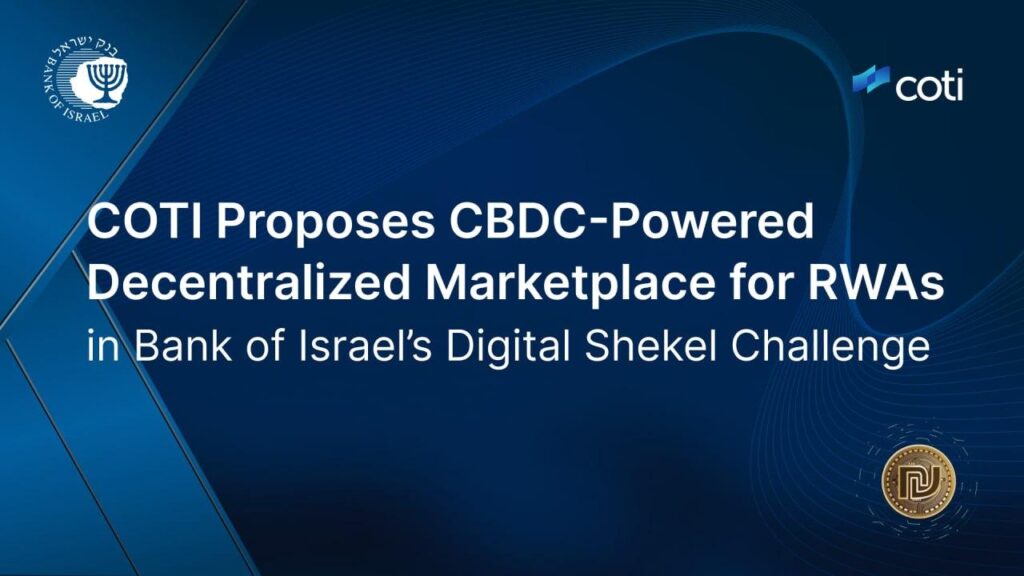Israel, Tel Aviv, October 31st, 2024, Chainwire
Today, The Bank of Israel concluded its Digital Shekel Challenge, with final presentations and awards at the Tel Aviv Stock Exchange. Layer 2 privacy blockchain COTI presented a cutting-edge CBDC-powered decentralized marketplace for Real-World Assets (RWAs) to a judging panel.
As the only blockchain project to advance to the final stages of the Digital Shekel Challenge, COTI appeared alongside the likes of PayPal, Fireblocks and a dozen other teams specializing in fintech, privacy, and networking. Paypal’s salary management system picked up an award.
The overarching goal of the challenge was to create a two-tier model for issuing a CBDC, using an API layer to provide a set of functionalities for payment service providers. At the same time, the solution must connect end users to a broad and innovative range of services while maintaining user privacy and optimizing for security and reliability.
COTI’s submission took the form of a decentralized event ticket marketplace to bridge the gap between traditional banking systems and web3 where counterparties could transact in their local currency with the Digital Shekel serving as the mediating currency. It took inspiration from Icebreaker, a cross-border CBDC payment system developed by the BIS (Bank for International Settlements).
Deploying a smart contract-based marketplace removed the need for intermediaries and limited fraud while lowering transaction fees and conversion rates. While COTI’s demo focused on concert tickets, the concept could be applied to numerous global markets using a CBDC to streamline asset exchange.
COTI’s demo for the Digital Shekel Challenge can be viewed here: https://youtu.be/D1VqgRjOVP4?feature=shared
There is widespread interest in CBDCs, with three countries having launched one so far, another 44 in the trial phase and a further 20 in active development. COTI advocates for CBDC implementations that strike a balance between transparency and privacy, enabling commerce to flourish without the risk of governmental overreach.
COTI’s contribution to the Bank of Israel Digital Shekel Challenge aimed to demonstrate how privacy-by-design can secure the growth of open digital marketplaces while respecting user privacy and financial freedom.
The privacy-focused blockchain developed by COTI offers advanced features to hold and securely transact with CBDCs. Its fast and lightweight privacy solution uses a novel implementation of garbled circuits, offering significantly lower running costs than other privacy technologies and can run on any device including mobile. The technology has the potential to enhance CBDCs as a secure means of payment.
COTI will now turn its attention to the development of further use cases that tackle privacy concerns within CBDC design.
About COTI
The COTI Network is the fastest and lightest confidentiality layer in Web3. Powered by the breakthrough cryptographic protocol Garbled Circuits, COTI introduces the most advanced and compliant solution for data protection on the public blockchain. Paving the way for the next wave of Web3 innovation and adoption, COTI unlocks a whole new world of use cases, including confidential transactions, Artificial Intelligence, DeFi, decentralized identification, and more.
Learn more: https://www.coti.io/
Contact
CEO
Shahaf Bar-Geffen
contact@coti.io
The post COTI proposes CBDC-powered decentralized marketplace for RWAs in Bank of Israel’s Digital Shekel Challenge appeared first on Chainwire.

